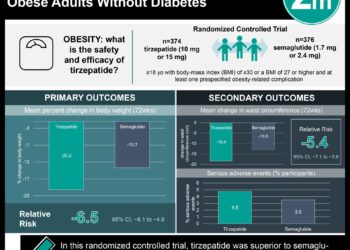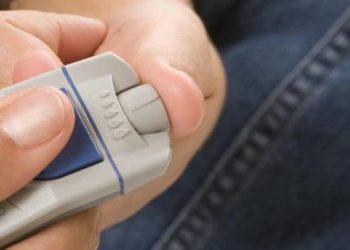Weight loss and lifestyle changes may improve symptoms of obstructive sleep apnea in overweight men
1. A randomized controlled trial of moderate- to severely-overweight men who had obstructive sleep apnea treated with Continued Positive Airway Pressure (CPAP) demonstrated clinical symptom improvement following an interdisciplinary weight loss and lifestyle modification regime.
Level of Evidence Rating: 1 (Excellent)
Study Rundown: Obstructive sleep apnea (OSA) is a sleep disorder resulting from dysfunctional breathing overnight, whereby intermittent airway collapse causes periods of apnea and poor sleep quality. A leading cause of this condition is obesityContinued Positive Airway Pressure (CPAP) machines are common and highly effective in managing OSA, although they can be resource intensive and cumbersome for patients, sometimes leading to poor therapeutic compliance. The present study by Carneiro-Barrera et al sought to evaluate the effectiveness of a multidisciplinary weight loss and lifestyle intervention for CPAP-dependent OSA patients with moderate to severe obesity. 89 men were enrolled in this trial in total, with 49 participants randomized to the control group and 40 to the intervention group. The mean age of participants was 54.1 years; all were men of Spanish ethnicity. Baseline sociodemographic factors were balanced between the two groups. The primary outcome was the reduction in number of apneic events per sleep as measured by the Apnea-Hypoapnea Index (AHI); participants in the intervention group experienced a mean reduction in AHI from 41.6 events/hour at baseline to 20.4/hour after 8 weeks and 17.8/h at 6 months. No significant change in AHI occurred in the control group participants over time. At the end of the intervention period, 57.5% of patients in the intervention group had improved their OSA score by at least one category (i.e. from severe to moderate, or from moderate to mild) and 15.0% of patients experienced complete remission. Improvements to cardio-metabolic risk factors (i.e., oxyhemoglobin desaturation index) were stable after the intervention period. This randomized controlled trial by Carneiro-Barrera et al demonstrated unequivocally the benefits of weight loss and healthy lifestyle changes in reducing the severity of obstructive sleep apnea symptoms amongst patients who were overweight and had moderate-severe OSA at baseline. Although it is well-established in the literature that obesity is a primary risk factor for OSA, this evidence further reinforces how effective weight loss is for OSA symptom control and establishes a feasible and sustainable regime for achieving this. A primary limitation of this study is that the findings are only applicable to men; further study should be expanded for consideration of women with OSA. Additionally, few details regarding the nature of the intervention were given, making it difficult to reproduce the weight loss intervention broadly or to ensure access to care for individuals in the general population. Strengths of this study include the rigorous methodology and thorough analysis (i.e., several biological parameters measured demonstrating the success of the intervention over time). Weight loss and healthy lifestyle interventions should be encouraged amongst overweight individuals experiencing OSA.
Click here to read this study in JAMA Network Open
In-Depth [randomized, controlled trial]: A parallel, open-label randomized controlled trial by the name of INTERAPNEA was conducted in several hospitals in Spain to evaluate this clinical question. Eligible patients were men aged 18-65 years and had moderate to severe OSA (defined as >15 apneic events per night) which was treated with CPAP, and who had a body mass index greater than or equal to 25. Patients were recruited from a sleep-disordered breathing clinic and randomized between April of 2019 and January of 2020. Patients all completed a baseline history and physical examination and were subsequently randomized to the control group or the intervention group. The intervention consisted of an 8-week interdisciplinary weight loss and lifestyle alteration program; the 5 “modules” of this program were nutritional behavior change, moderate aerobic exercise, smoking cessation, alcohol intake avoidance, and sleep hygiene. The program was delivered through weekly group classes with a trainer, and the intervention was evaluated for feasibility outside of the study setting. Polysomnography was performed at baseline, at the end of the 8 week intervention period as well as 6 months later. 14 participants were unavailable for the 6 month follow up data collection and were assessed with intention to treat analysis; the remaining participants were analyzed per-protocol. The mean change in AHI scores over time in the intervention group was 51%, or -21.2 events/hour (95% confidence interval 25.4 to –16.9 events/h) at 8 weeks and –23.8 events/h from baseline at 6 months (–28.3 to –19.3 events/h). The mean change in AHI amongst participants in the control group was 2.5 events/h at 8 weeks (–2.0 to 6.9 events/h) and –0.8 events/h (–5.8 to 4.1 events/h). The mean reduction in body weight was 7.1kg (95% confidence interval -8.6 to -5.5kg) in the intervention group after 8 weeks of treatment, versus -0.3kg (-1.9 to 1.4kg) in the control group. Health related quality of life was also improved significantly in the intervention group as seen with the Sleep Apnea Quality of Life Index. The mean change at 8 weeks was 0.8 points (95% confidence interval 0.5-1.1) and 0.1 (-0.3 to 0.4) points amongst the intervention group. No significant changes in health related quality of life amongst the control group were noted at 8 weeks or at 6 months.
Image: PD
©2022 2 Minute Medicine, Inc. All rights reserved. No works may be reproduced without expressed written consent from 2 Minute Medicine, Inc. Inquire about licensing here. No article should be construed as medical advice and is not intended as such by the authors or by 2 Minute Medicine, Inc.







